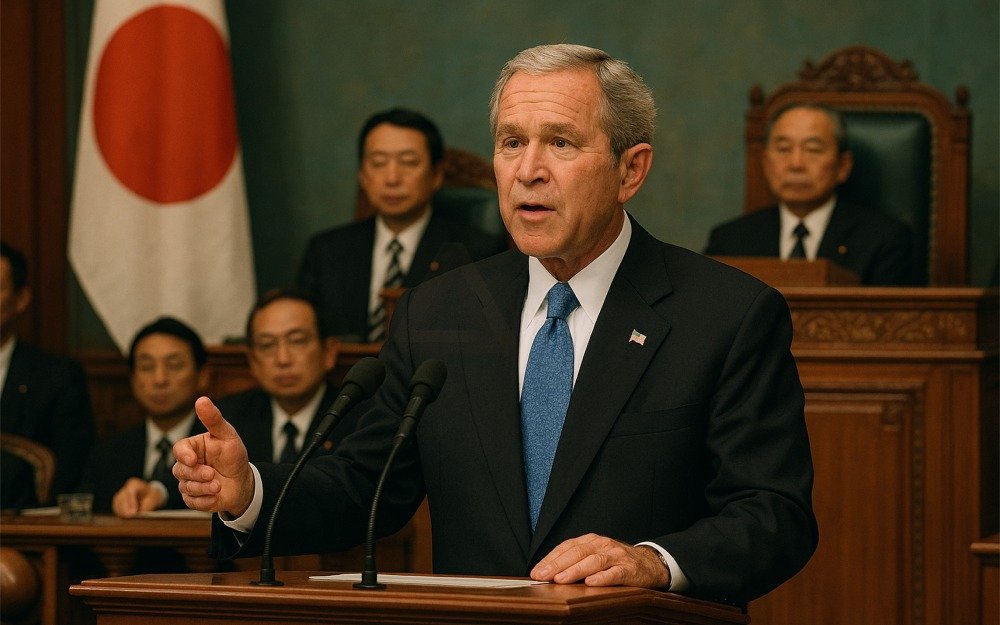
On February 19th, 2002, President George W. Bush stood before the Japanese Diet and offered a version of history that didn’t quite happen. His reference to “a century and a half” of peaceful U.S.–Japan relations skipped a few chapters — Pearl Harbor, Hiroshima, the Pacific War — none of which made the cut. The line wasn’t corrected. It wasn’t clarified. It was delivered, absorbed, and archived.
This post doesn’t aim to fact-check the moment. It threads it. Into a sweep of Bushisms — those surreal fragments of presidential speech that resist transcription, defy intent, and linger in public memory. Some are funny. Some are fractured. This one was diplomatic.
The Line That Wasn’t Corrected
Provenance Overlay
Quoted Line: “Japan and the United States have had a century and a half of peaceful relations.”
Source: White House transcript (archived) — ✅ Verified
Note: No mention of Pearl Harbor, Hiroshima, or the Pacific War. Inazo Nitobe quoted; wartime rupture omitted.
Bush’s phrasing —“a century and a half of peaceful relations” — wasn’t a slip of the tongue. It was scripted, delivered, and applauded. No correction followed. No clarification was offered. The line stood, quietly erasing Pearl Harbor, Hiroshima, and the Pacific War from the diplomatic ledger.
The Japanese Diet didn’t challenge it. The press didn’t dissect it. The moment passed, archived without annotation. It wasn’t the first time a president had rewritten history mid-sentence. It wouldn’t be the last.
This section weaves that line into a broader pattern: not of ignorance, but of rhetorical friction — where diplomacy intersects with narrative convenience, leaving the facts to defend themselves.
A Century and a Half of What?
The phrase wasn’t just historically inaccurate — it was narratively convenient. “A century and a half of peaceful relations” implies continuity, mutual respect, and diplomatic stability. It’s a timeline that begins in abstraction and ends in omission.
The actual ledger reads differently. Commodore Perry’s arrival in 1853 wasn’t peaceful. The Pacific War wasn’t a misunderstanding. Hiroshima wasn’t a footnote. Yet the phrase stood, uncorrected, as if history were a matter of tone.
Bush’s speechwriters may have intended optimism. What they delivered was erasure. Not malicious, not deliberate — just frictionless. And in that frictionless space, the past became optional.
The Diet, the Setting, the Silence
The Japanese Diet is not a casual venue. It’s formal, symbolic, and historically layered. Bush’s speech wasn’t off-the-cuff — it was delivered in a chamber where language carries weight, and silence often speaks louder than rebuttal.
The audience didn’t flinch. No audible reaction, no diplomatic correction, no post-speech clarification. The line passed through the room like a stylised caption — flattened, unchallenged, archived.
Inazo Nitobe was quoted. The Pacific War was not. The speech threaded optimism, but the omissions threaded something else. Not denial, not revision — just a kind of rhetorical latency, where history is present but unnamed.
When the Script Fights Back
Bushism Artifact
Quoted Line: “Our enemies are innovative and resourceful, and so are we. They never stop thinking about new ways to harm our country and our people, and neither do we.”
Source: White House transcript (archived) — ✅ Verified
Note: Delivered without correction. Line archived as spoken. Interpreted variously as gaffe, inversion, or rhetorical latency.
Bushisms aren’t slips. They’re collisions between intent and delivery, script and speaker, clarity and cadence. They resist transcription. They defy paraphrase. And they linger.
The Tokyo line was diplomatic. The 2004 Pentagon line was something else: Delivered in Washington, D.C., August 5, 2004. Scripted. Archived. Uncorrected.
It wasn’t satire. It wasn’t irony. It was a moment where the sentence became the story, and the speaker became the punchline.
Bushisms Aren’t Just Mistakes
They’re errors, yes — but they behave like a genre. They repeat. They follow patterns. They resist correction. And they linger. Some are funny. Some are surreal. Some, like the Tokyo line, are quietly diplomatic. Others, like the Pentagon quote, are structurally inverted — where the speaker becomes the subject, and the sentence loops back on itself.
They’re not always corrected. They’re rarely clarified. They live on in transcripts, soundbites, and editorial memory. Not because they’re profound, but because they’re perfectly broken.
Practice their What?
Speech Artifact
Quoted Line: “Too many OB-GYNs aren’t able to practice their love with women all across this country.”
Source: White House transcript (archived) — ✅ Verified
Note: Delivered during prepared remarks. Preserved in official transcript without correction. Phrase critiqued for unintended intimacy and awkward metaphor.
They Said It, We Saved It
These weren’t off-the-cuff remarks. They were scripted, delivered, and preserved. Not corrected. Not clarified. Just spoken aloud and left to echo.
The speaker moves on. The audience forgets. But the line lives.
Think that was strange? There’s more. Explore our full They Said WHAT? archive.
References:
[1] Bush, G. W. (2002, February 19). Address to the Japanese Diet. In Public Papers of the Presidents of the United States: George W. Bush, 2002 (Book 1, pp. 249–252). United States Government Printing Office. Retrieved from https://bookstore.gpo.gov/products/public-papers-presidents-united-states-george-w-bush-2002-book-1-january-1-june-30-2002
[2] Bush, G. W. (2004, August 5). Remarks at Pentagon signing ceremony. In Public Papers of the Presidents of the United States: George W. Bush, 2004 (Book 2, July 1–September 30, 2004). United States Government Printing Office. Retrieved from https://bookstore.gpo.gov/products/public-papers-presidents-united-states-george-w-bush-2004-book-2-july-1-september-30-2004
[3] Bush, G. W. (2004, September 6). Remarks on medical liability reform in Poplar Bluff, Missouri. In Public Papers of the Presidents of the United States: George W. Bush, 2004 (Book 2, July 1–September 30, 2004). United States Government Printing Office. Retrieved from https://bookstore.gpo.gov/products/public-papers-presidents-united-states-george-w-bush-2004-book-2-july-1-september-30-2004
